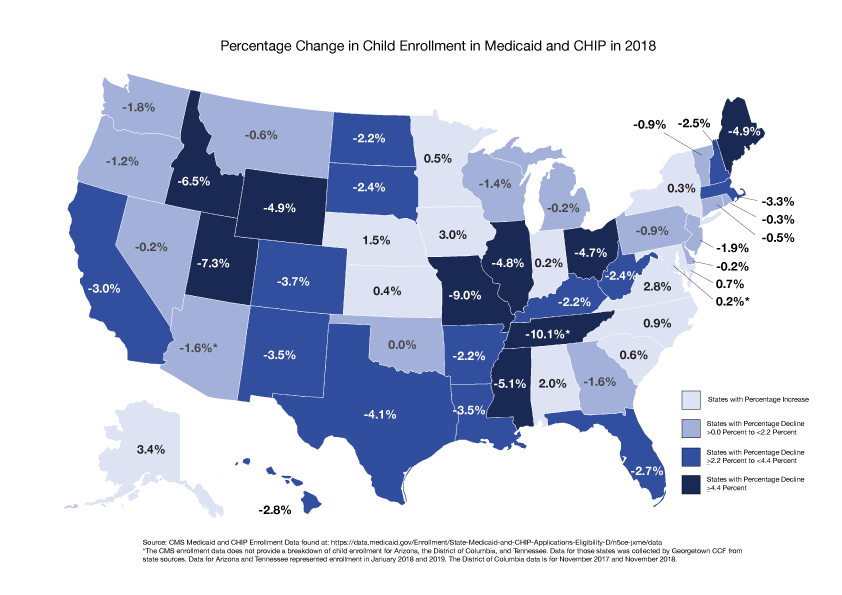Along with the American Academy of Pediatrics, First Focus and the Children’s Defense Fund, Georgetown University CCF held a press tele-conference and released a report examining an alarming trend in children’s health coverage. The report shows that more than 800,000 fewer children had Medicaid/CHIP coverage at the end of 2018 compared to 2017. This trend comes amid broader efforts to restrict access to health coverage and discourage participation by legal immigrants.
The report found little evidence to support claims that the improving economy was responsible for the 2.2 percent decline in enrollment. Instead, data suggest that 2018 could be the second year in a row that the rate of uninsured children increases. The U.S. Census Bureau will release the 2018 child uninsured rate data later in the fall.
Enrollment declines are concentrated in seven states – California, Florida, Illinois, Missouri, Ohio, Tennessee, and Texas – which account for nearly 70 percent of the losses. Nine states – Idaho, Illinois, Maine, Mississippi, Missouri, Ohio, Tennessee, Utah, and Wyoming – had decreases of more than double the national average.
Please listen to the recording of the press tele-conference or read the report for more details. Here are a few excerpts from Thursday’s press tele-conference:
CCF’s Joan Alker moderated the press tele-conference and explained why this drop in child enrollment is so alarming.
“We are extremely concerned about what we are seeing and what it portends for the uninsured numbers this fall,” she said. “For many years there’s been a national bipartisan commitment to reduce the number of uninsured children and the efforts have borne fruit. Unfortunately, today we do not feel confident that this national commitment still exists.”
CCF’s Tricia Brooks, lead author of the report, explained the many factors that have likely led to the decline in child enrollment.
“Knowing that the economy had a minimal impact at best, we must call on state and national policymakers to address the factors contributing to the enrollment decline,” said Brooks. “From systems and renewal issues to enrollment barriers to threats like public charge, we must take a hard look at what these administrative actions and barriers to coverage mean for our kids’ health.”
Dr. Laura Guerra-Cardus, deputy director for the Children’s Defense Fund of Texas explained how overly cumbersome eligibility checks are causing thousands of eligible children to lose coverage in her state. Nine out of every 10 Texas children being dropped are losing coverage due to red-tape, according to CDF-TX. She said the disenrollment is causing significant confusion for families and throughout the Texas health care system as many families don’t learn their children are uninsured until they show up for an appointment with their health care provider.
“These income checks are erroneously flagging families – at the very least 30% of the time. Families are not being given enough time to respond,” she said. “They are given only ten days to respond and the timeline starts once flagged by the system, which could be before the parents even receive notification.”
Bruce Lesley, president of First Focus, pointed out that bipartisan legislation in the U.S. Congress would address the issues raised by Dr. Guerra by requiring 12 months continuous health coverage for children. He also cited polls that show strong support for children’s health coverage in general.
“The American public is with us on this. Kids are a priority but we’re seeing a failure of policymakers to adhere to what voters want and make children a priority,” Lesley said.
Dr. Lanre Falusi, a pediatrician at the Children’s National Health System and national spokesperson for the American Academy of Pediatrics said pediatricians are very concerned about the decline in Medicaid and CHIP enrollment. In addition to cumbersome enrollment processes and administrative burdens discouraging families from enrolling eligible children, she pointed out that immigrant families also encounter the chilling effect created by the proposed public charge rule.
“The public charge proposal presents immigrant families with an impossible choice: keep your family healthy but risk being separated or forgo vital services like Medicaid so your family can remain together in this country. Although the final rule has yet to be issued, the proposal has already caused immigrant families to avoid or even disenroll from programs they are eligible for out of fear, like Medicaid. I have seen this myself,” Dr. Falusi said.
“We need all children in the United States to reach their full potential if we are to reach ours as a nation. Ensuring children are enrolled in health coverage designed to meet their needs is necessary to making that possible. Our lawmakers must pass policies that keep programs like Medicaid and CHIP strong, not those that jeopardize the critical gains we’ve made in children’s coverage.”


